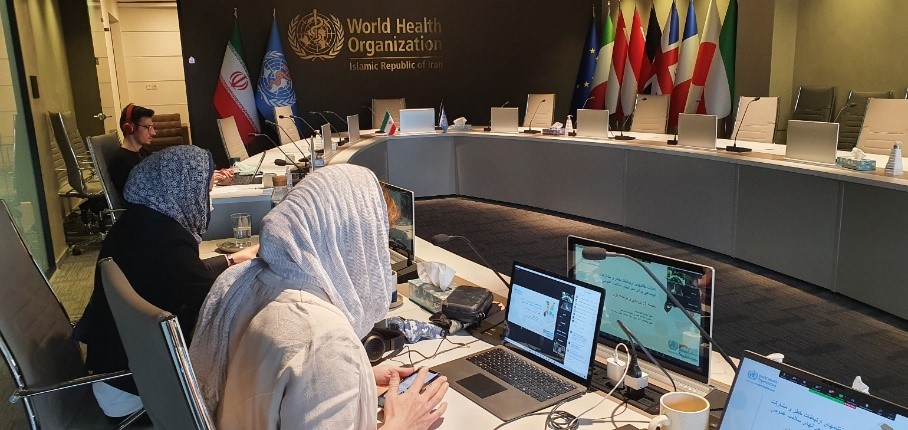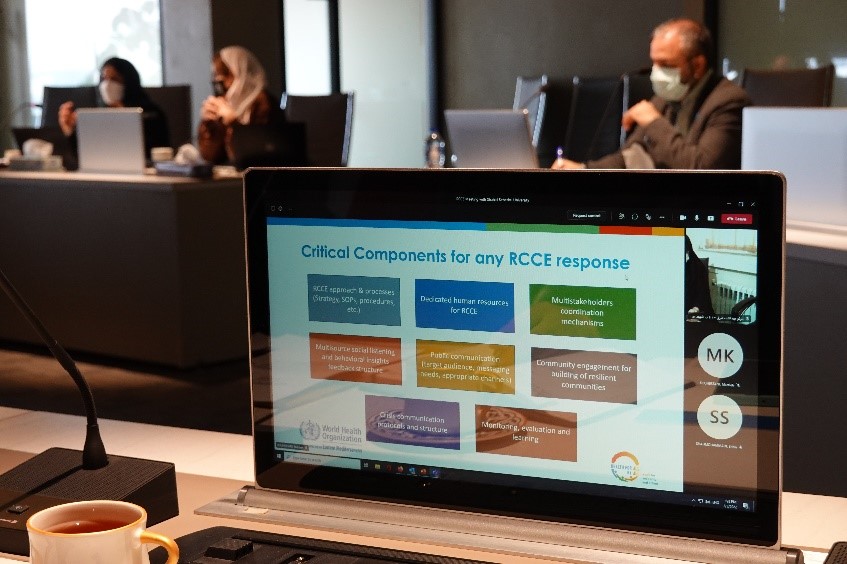 Facilitators at the RCCE training on March 2–3 March using a hybrid modality at the WHO country office in Tehran. Credit: WHO/Islamic Republic of Iran
Facilitators at the RCCE training on March 2–3 March using a hybrid modality at the WHO country office in Tehran. Credit: WHO/Islamic Republic of Iran
Sunday, 17 April 2022 – The World Health Organization (WHO) in the Islamic Republic of Iran has stepped up support to the country in building capacity to implement International Health Regulations (IHR) by conducting a 2-day workshop on risk communication and community engagement, with an emphasis on the ongoing COVID-19 pandemic
The workshop, planned as part of a 2-week mission to the country, aimed at enhancing national emergency preparedness and response in health crises, and was facilitated by Ms Rose Aynsley, WHO consultant on RCCE from the WHO Regional Office for the Eastern Mediterranean.
Held virtually at WHO country office in Tehran on 2–3 March the training targeted 90 professionals from the Ministry of Health and Medical Education and universities of medical sciences, including public health experts, physicians, laboratory technicians, health workers and public relations experts from all 31 provinces across the country.

In recognition of the need for a robust RCCE mechanism and structure, the Ministry expressed enthusiasm to endorse the training as support to development of a national RCCE strategy and work plan, which would mark a critical milestone in improving IHR core capacities in the country.
An RCCE mechanism in place provides the policy and structural framework for systematizing and institutionalising RCCE in the country. The RCCE strategy envisions building a structure for RCCE across all the tiers of governance, including at national and provincial levels and in towns and districts across Islamic Republic of Iran that could be applicable in the case of the COVID-19 epidemic and other potential crises.
The mission also provided opportunities for experts from WHO and the Ministry to discuss ongoing efforts in emergency preparedness and existing challenges, as well as gaps, and brought together United Nations agencies operating in the country in brainstorming sessions to build a unified cluster for cross-sectoral collaboration in RCCE.
The mission concluded with a briefing session by Ms Aynsley for health officials at the Ministry of Health and Medical Education on the mission’s takeaways and recommendations as shared in meetings, networking sessions and training.
 The mission provided opportunities for experts from WHO and the Ministry of Health and Medical Education to discuss ongoing efforts in emergency preparedness and existing challenges, as well as gaps. Credit: WHO/Islamic Republic of Iran
The mission provided opportunities for experts from WHO and the Ministry of Health and Medical Education to discuss ongoing efforts in emergency preparedness and existing challenges, as well as gaps. Credit: WHO/Islamic Republic of Iran




